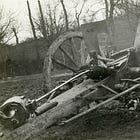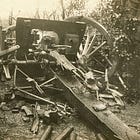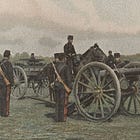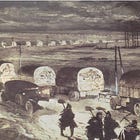This is the sixth installment of a decision game. If you have not done so already, please read (or work through) the first five posts in this series.
Solution to the Fourth Problem
To deal with the problem of premature explosions in monobloc shells, you mandate that all shells pass the pressure test that had been required prior to the great expansion in shell production that began in the fall of 1914. In particular, you mandate that, beginning on 15 April 1915, manufacturers subject every shell that they deliver to pressures of 1,400 kilograms per square centimeter. You also arranged for the payment of a premium for every shell delivered prior to 15 April 1915 that had passed such a test.
To deal with the issue of the extraordinarily high rate of premature explosions in the Fourth Army, you ask General Gosset to make a special study of the ammunition issued to batteries serving in that formation.
The Fifth Problem
On 16 April 1915, General Joffre informs War Minister Millerand that 805 field guns are needed to bring the forces in the filed up to establishment. (This figure does not include the 120 field guns needed to replace the older ordnance issued to the field batteries of the five new infantry divisions that were then being formed.)1
On 23 April 1915, General Joffre orders the generals commanding armies in the field to investigate the causes of premature explosions taking place in their commands and, at the same time, arrange for the visual inspection of all shells issued to artillery batteries. (He bases the latter measure on his belief that some of the defects associated with premature explosions are obvious to the naked eye.)
So, General Baquet, what do you do?
This game concludes with the following post:
To Share, Support, or Subscribe:
The five infantry divisions formed in April of 1915 were given numbers that began with “151” and ended with “155.”











1. Continue ordnance inspections/ammunition surveillance of already produced ammunition, particularly bibloc rounds and assure General Joffre that all such inspections will include visual inspections.
2. If current production lines in France cannot produce the number of weapons required by the times required, look around in the UK, Spain, the USA and anywhere else feasible for additional manufacturing capacity, especially if any increases by French sources would disrupt ongoing manufacturing contracts.
Devote all my efforts to increasing the production of tubes - M. Joffre has implemented measures that he hopes will minimise the risk of premature shell explosions, meanwhile we need 1000 more artillery pieces as of yesterday.